St Werburgh's Roman Catholic Parish, Chester

SVP lead Scriptural Stations of the Cross
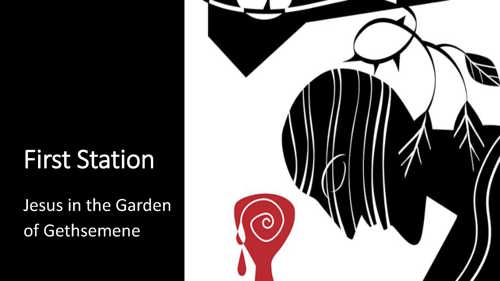
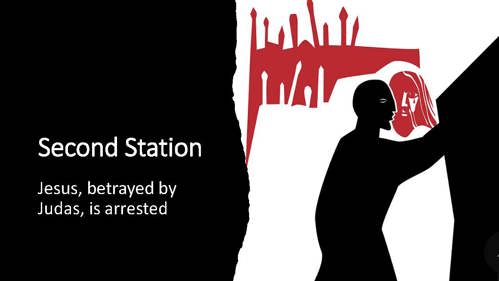
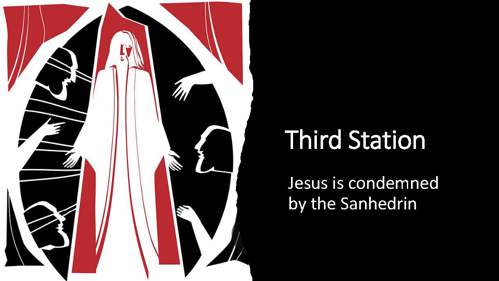



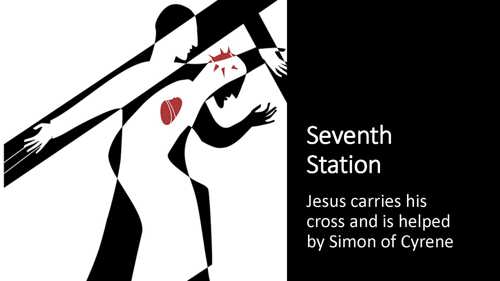


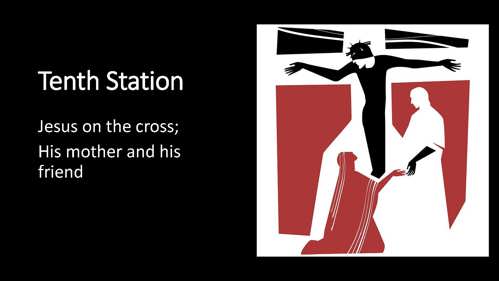

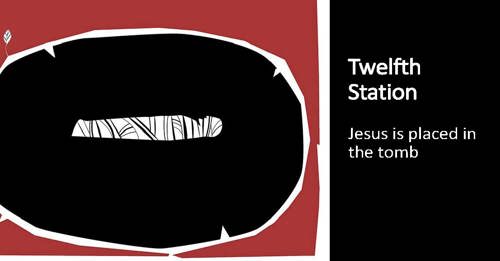
One of our very newest SVP Conference Members, Claire Egan, took the lead in celebrating the Spiritual Stations of the Cross at St Werburgh’s, on the evening of Friday 15th March.
Claire had designed a most memorable presentation to inspire and encourage the assembled group’s prayerful meditations and devotions.
We are privileged to show a selection of them, as follows:
Through these Stations of the Cross, Jesus is inviting us to journey with him; to walk alongside him as he carries his burden.
The Saint Vincent de Paul Society in this parish aims to find practical ways to walk alongside people, whatever their situation, to share and where possible, to help alleviate their burdens.
We’ll reflect this evening on the suffering of Jesus, on its parallels in the lives of people in our world today, and on ways in which we can participate in pointing, through faith in action, to a hope beyond it.
We pray that as we journey with Christ, we will be open to whatever he wants us to see, hear and understand.
Let us pray.
God of power and mercy,
you sent your Son into the world
that we might see in him a revelation of your love
and through him, participate in your life.
Bless us as we gather to reflect
on his suffering and death
that we may learn from his example
and follow in his steps.
We ask this through Christ, our Lord.
Amen.
First Station: Jesus in the Garden of Gethsemane
In the Gospel story, the disciples – tired after a long day and unable to stay awake, are blinded to the needs of Jesus.
How often do we fail to see what’s right there in front of us? I don’t know if you’ve seen the video clips of a test carried out by psychologists in which a group of students are given a basketball and we, as the viewers, are asked to carefully count the number of times they pass the ball between them. While we’re watching, another person in a gorilla costume walks right through the middle of the group. But most people watching don’t even notice. It’s called inattentional blindness. They are focusing so hard on the basketball, they fail to see what else is going on. They need to watch the video again and have the gorilla pointed out to them. A little bit like that, we’re very often so focused on our own immediate needs – on our work, or our family, or our own wellbeing, that we fail to look outwards and see the needs of others around us.
Frederic Ozanam, the founder of the SVP, as a young student had to walk through the poorer suburbs of nineteenth century Paris on his way to university lectures each day. He walked past desperate families who had been left without the support of their breadwinners after deaths in an epidemic. But it wasn’t until he was challenged by another student in the context of a debate that he was prompted see differently and to take action. The student asked him: “What is your Church doing now…for the poor of Paris? Show us your works and we will believe you!”. In response, Frederick gathered a group of friends around him to decide what they could do to help those in need. They went out into the streets, taking material assistance and listening to the needs of people in living in poverty.
What will it be that opens our eyes to the needs of others and challenges us to take action?
Second Station: Jesus, betrayed by Judas, is arrested
St. Vincent de Paul, (1581-1660), after whom the SVP was named, is primarily remembered for his charity and compassion for the poor. It seems strange, then to associate him with Judas Iscariot, who is remembered in the Gospel for the wickedness of his action in betraying Jesus.
But Vincent de Paul mentions Judas more than fifty times in his writings. In one example, from 1659 Vincent used Judas to refer to his own life. He wrote in a letter,
“I conclude by recommending myself to your prayers, which I ask you to offer so that God will pardon me the incomparable faults I commit every day in the position I hold—I who am the most unworthy of all… and worse than Judas was toward Our Lord.”
One aspect of Judas’s life that Vincent was particularly aware of was that it began well but ended badly. In another letter, he said:
“Always remember that in the spiritual life little account is taken of the beginnings. People attach importance to the progress and the end. Judas had begun well, but he finished badly; and Saint Paul finished well, although he had begun badly. Perfection consists in a constant perseverance to acquire the virtues.”
What is the pattern of our lives? What are the things that lead us to betray our best intentions?
Third Station: Jesus is Condemned by the Sanhedrin
The council of the elders and the people, the Sanhedrin, had already made up their minds about Jesus; already condemned him before he had a chance to speak. They literally pre-judged him.
Many people in our society face prejudice on the grounds of their ethnicity, gender, sexuality, disability, belief, or simply because they don’t conform to our expectations or ways of thinking.
How often, like the Sanhedrin, do we view people through the lens of our own prejudice, in effect without looking beneath the surface to really understand each individual?
Of course, we might say, “I’m not prejudiced!” No doubt the members of the Sanhedrin would have said the same. But if we really think about it carefully, aren’t our own images of people – even if subconsciously – biased, influenced by prior expectations? Our limited perspective prevents us from seeing differently.
The Council and the elders in this story are rendered unable (by their limited vision, influenced by political expedience) from seeing who Jesus truly is.
What limitations in our vision prevent us from seeing Christ in others?
Fourth Station: Peter denies Jesus
Sometimes people can be inconvenient. Being associated with them can feel challenging or even risky. Their behaviour may be unpredictable and doesn’t always fit with society’s, or the Church’s normal expectations. They are in effect often pushed to the margins of society, sometimes out of sight in hospitals and care homes. Like Peter in the courtyard denying Jesus, it may feel easier at times not to associate with them; to pretend they are not there.
The SVP’s vision of social justice is to “empower, advocate and campaign for people”, particularly those on the margins, those living in poverty of any kind and those facing discrimination.” (https://svp.org.uk/social-justice).
In what ways can we as a Church bring those on the margins of society into the heart of our community?
Fifth Station: Jesus is Judged by Pilate
Pilate, prompted by fear, washes his hands of all responsibility for justice in Jesus’ trial. He fears going against the condemnation of Jesus expressed by the crowd; their wish for Jesus to be crucified. He fears that if he judges differently, there will be a riot. He wants to maintain his own power.
It can be dangerous to stand out from the majority; to go against the expectations of society. But doesn’t the Gospel require precisely that? In Jesus, all expectations of power and powerlessness are overturned.
How often do we sit on the fence, afraid to speak out or act, or just more concerned to maintain our own comfort? How can we better work for justice?
Sixth Station: Jesus is Scourged and Crowned with Thorns
Bullying, name-calling, belittling, violence. Jesus experienced emotional and physical abuse.
The SVP is privileged to be able to work with some of the most vulnerable people in our community. But this privilege carries with it a responsibility. The SVP is committed to safeguarding:
- Actively promoting the empowerment and well-being of adults and children we may come into contact with.
- Recognizing that everyone has the right to live their life free from violence, fear and abuse.
- Recognizing that adults and children have the right to be protected from harm and exploitation.
- A zero tolerance for abuse and holding those responsible to account.
How can we all as a community ensure that people, including those who are vulnerable, or in vulnerable situations are empowered and protected?
Seventh Station: Jesus Carries his Cross and is helped by Simon of Cyrene
In John’s Gospel, Jesus is made to carry his own cross. In Mark and the other Gospels, a passer-by, Simon of Cyrene is enlisted to carry it for him. Christian tradition has brought these two accounts together and focused on Jesus struggling and falling under the burden of the cross before being helped by Simon.
Many people are overburdened by the crosses they carry, or struggle with the circumstances they find themselves in. Poor health, unemployment or debt with no family support, loneliness, isolation.
St. Vincent de Paul was concerned to put the Church at the service of those who were poor, helping people with their burdens. And Frederick Ozanam, the founder of the SVP, saw its purpose as being to respond to every person in need. Both responded to the needs that presented themselves in their own contexts and times. They saw the suffering Christ in the realities of life that they encountered and responded in practical ways. The work of the SVP continues today.
What are the ways in which we can support others and help them to carry their burdens?
Eighth Station: Jesus Meets the Women of Jerusalem
Jesus sees beneath the surface of what is going on. The women he meets along his way to the place of crucifixion are weeping; lamenting the fact that he is about to die. But the wider circumstances of what has led to his condemnation are occupation of Jerusalem by the Romans and the self-preservation of the Jewish leaders. The women he meets have had their lives deeply affected by the time and place in which they live and by circumstances beyond their control. They feel powerless to change things. Jesus foresees that things will only get worse for them in the future, when, following a Jewish revolt against the Romans, the Temple will be destroyed. He sees the bigger picture of what is going on for them.
How often do we take the time to really listen to someone, to meet them where they are, to look beneath the surface to what is going on for them and to try to understand the bigger picture of what has led this person to this place?
Ninth Station: Jesus is Crucified and Promises the Kingdom to the Penitent Thief
Jesus here is speaking to someone in the most desperate of circumstances. This is someone who has been sentenced to death for a crime they have committed and is therefore condemned and despised by others; someone in excruciating pain (the word literally comes from crucifixion); someone who knows that they will die within the next few hours or days. The person next to Jesus is, in short, someone who lacks much reason for hope. And yet something about the presence of Jesus gives him hope. “Remember me, Jesus,” he says, “when you come into your kingdom”.
In 1605, Vincent de Paul was returning home by boat from a trip. He had been on his way to sell some property he had received in an inheritance. While travelling, he was captured by pirates, who sold him into slavery in North Africa. He remained a slave for two years. After he was freed, whilst serving in a parish in rural France, he encountered extreme poverty, with those unable to find work often suffering from starvation. He set about organising groups to provide practical assistance, and later, founded hospitals, orphanages and homes for people who were mentally ill. He devoted his last years to serving prisoners and slaves, sharing with them his story of hope as a former slave himself.
St. Vincent de Paul through his practical action, his service and his presence in faith with those who lacked basic necessities, security or freedom, provided hope to those who previously had little.
Where, when and how can we become bringers of hope?
Tenth Station: Jesus on the Cross, His Mother and His Friend
We see Mary’s pain in all who are facing the loss of a loved one, those who are angry and shocked by the unexpected terminal illness of a friend, and those who are bereaved.
In Mary’s case, as a woman in first century Palestine, that bereavement may well also have led to a loss of household income, or protection. We see Mary at her most vulnerable both emotionally and in a practical sense.
Jesus, even in the midst of his own vulnerability and pain, still looks out for Mary. He makes sure that she is cared for and that she can still feel part of a family, with the support and love that that entails.
Members of the SVP in our parish reach out to people who may feel isolated due to illness or bereavement. SVP events, including the Christmas meal and the High School provide a chance to get out and be together for people who may otherwise be housebound.
Welcome Wednesdays at St. Werburgh’s also provide times within the parish to meet with others.
How can we as a church family continue to be open to encompassing new members, to make people feel welcomed; to reach out to people and to ensure that people feel loved and included in our life?
Eleventh Station: Jesus Dies on the Cross
Pain, fear, loss, being abandoned, separation – these are all circumstances that can lead to feelings of being alone. The Gospel story particularly as told by Mark and Matthew, indicates that even Jesus felt alone in in these circumstances during his last moments on the cross: “My God, my God, why have you forsaken me?”. It seems at that even the Father he loves has deserted him and that he has to fend for himself.
And yet, at the very time that Jesus breathes his last, something else happens. The veil in the Temple is torn in two. This curtain symbolised the separation of the main body of the Temple, which most people could enter and walk around, from the holy of holies, the place where God’s presence dwelt. Now it is torn and there is no longer a barrier between God and human beings. We can enter into God’s presence bringing all that we are, including our joys and our pain. We need never be alone.
In Christ, God embraces everyone: all those who feel abandoned, those struggling with pain, or fear or separation.
How do we consciously enter into God’s presence?
And how can we bring through our own presence with others, a sense of that Gospel message of God being with us?
Twelfth Station: Jesus is Placed in the Tomb
As we contemplate this twelfth station, we’re going to listen to a hymn written by Rufino Zaragoza, OFM called, “From the Wounds of Christ”, accompanied by some pictures, which include aspects of the work of the SVP.
Holy Trinity,
Whose nature is revealed to us through the death of Jesus,
help us to see the beauty of your eternal love,
and to grow into your likeness.
Glory be to the Father, and to the Son, and to the Holy Spirit,
As it was in the beginning, is now, and ever shall be.
Amen.
